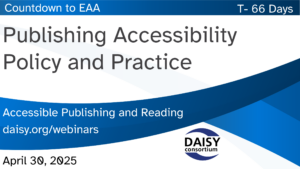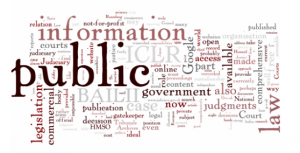Publishing Accessibility Policy and Practice T-66 (W)

In our series of free weekly webinars April 30th saw a session focused on Publishing Accessibility Policy and Practice concentrating on some of the behind the scenes efforts that publishers and service providers are making to support accessibility practices.
This page contains:
Full Video of the Webinar
Speakers
- Richard Orme, The DAISY Consortium—host and chair
- Elisa Molinari, The LIA Foundation
- Kristina Kramer, Börsenverein des Deutschen Buchhandels e. V.
- Stacy Scott, Taylor and Francis
Session Overview
Richard Orme welcomed everyone and introduced today’s topic of Accessibility Policy and Practice. As we count down the days to the EAA this session looks at how having communication systems and internal practices n place can help us all approach the new legislation.
Elisa Molinari
Elisa shared with us the latest updates from the EU project APACE (accelerating publishing accessibility through collaboration in Europe), which involves participants from Italy, Germany, Bulgaria, Lithuania, Finland and the Netherlands. Some interesting survey results from the initiative revealed a noticeable rise in awareness and responsibility for accessibility being taken by departments other than publishing production departments.
That being said, there are still challenges that remain around training needs, image description, backlist remediation and AI. But the outstanding takeaway from this project is the notion of collaboration between the stakeholders. This type of work has paved the way for future projects and provided an opportunity for information sharing and co-ordinated work groups.
For the LIA Foundation, the arrival of the EAA has helped to make accessibility the most notable drive for innovation in the publishing industry at the moment. All publishers work differently and it has been enlightening to experience how varied the approach can be. Some begin with training whereas others dive straight into the weeds of the technical areas. Some concentrate on their platforms and websites, publishing an accessibility policy and focusing on customer service. But everyone needs to think about quality assurance and metadata at some point – making sure that the content is accessible and that readers know about it. The LIA Foundation is currently working hard to help retailers and publishers to display accessibility metadata – the recent publication of the Accessibility Metadata Display Guide 2.0 is a huge help with this.
Elisa reminded us that accessible publishing is all about producing high quality digital content and in the words of Andre Angiolini (Il Molino)
As we began producing ebooks, we raised the quality standard of our printed books. Similarly our involvement in accessibility has advanced the quality of both our ebooks and websites.
Kristina Kramer
Kristina explained that the EAA was implemented into German law in July 2021 before being enforced in June 2025 and the German Booksellers and Publishers Association has a diverse membership from many different areas of the publishing ecosystem. In order to serve their members the association set up an accessibility task force in 2020 collaborating with colleagues from many German speaking nations and many international bodies.
The task force has formed many specific working groups to focus on topics such as EPUB, metadata, educational materials to name but a few. In all areas the concentration has been around awareness building and training, resulting in a large pool of resources and ongoing events.
Kristina urged publishers not to be afraid of accessibility. It is indeed a process and every small step is worth taking. There is a huge amount of information available and it’s important to have conversations with colleagues and contacts about how they are approaching accessibility in their working environments. But if there is one thing you do, make sure it is to include accessibility metadata in all your content!
Stacy Scott
Stacy is a strong advocate for accessibility both at Taylor and Francis and as Chair of the Publishers Accessibility Action Group (PAAG) in the UK. With 2 pieces of legislation coming up, the EAA and the ADA Title 2, Stacy reassured everyone that both are based on WCAG and, as a result can be “conquered in harmony”!
Although Taylor and Francis is well informed about what is required in pulling together a policy and strategy, it’s not always straightforward to drive this forward in terms of resources and budget. Very often support for accessibility isn’t driven by company leaders and it can be difficult to advocate upwards.
Building grassroots support for accessibility by gathering advocates, demonstrating small wins and proving value are some of the key ways to get leadership fully on board to drive accessibility from the top down.
To do this it’s a great idea to form an accessibility working group in-house that garners members from all areas of the organization. There is strength in numbers and this can be a useful way to influence senior staff. In addition, having an internal community is crucial for converting policy into practice.
Once accessibility becomes part of company policy and practice it’s important to let customers know that accessibility matters. There are many ways to do this, via marketing, metadata, end user testing, conformance reports and accessibility statements. Allowing your customers to make informed choices about content is excellent and providing them with a roadmap of what’s to come is even better! Their support also provides convincing for your working group and internal leadership.
Stacy finished by giving us some quick wins to help turn policy into practice:
- Form an accessibility working group
- Develop an accessibility roadmap
- Establish a key accessibility contact in-house
Related Resources
Our presenters and their organizations:
- Elisa Molinari LinkedIn
- The LIA Foundation
- Kristina Kramer LinkedIn
- Börsenverein des Deutschen Buchhandels e. V.
- Stacy Scott LinkedIn
- Taylor and Francis
Resources mentioned:


 Understanding the legal framework within your own publishing market is crucial if you are going to successfully deliver born accessible content to all of your readers. It gives you the basis around which to develop an accessible publishing policy and business plan for your entire organization and for your interactions with 3rd party suppliers, vendors and partners.
Understanding the legal framework within your own publishing market is crucial if you are going to successfully deliver born accessible content to all of your readers. It gives you the basis around which to develop an accessible publishing policy and business plan for your entire organization and for your interactions with 3rd party suppliers, vendors and partners.